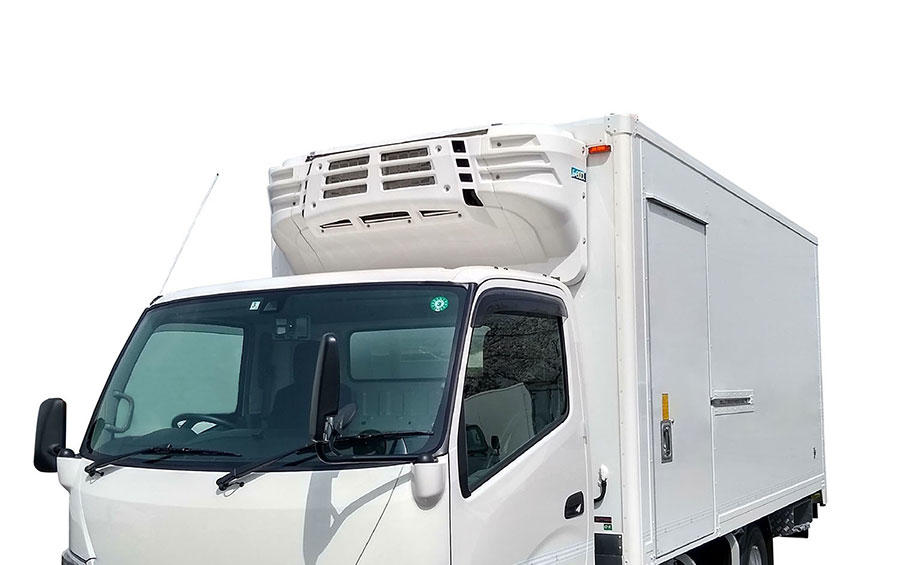Top Attributes to Look for in Leading Refrigerated Truck Companies
Wiki Article
A Detailed Review of the Devices Behind Refrigerated Truck Transport and Its Function in Food Safety
Refrigerated vehicle transport is important in preserving food security, using advanced temperature control devices and insulation innovations to safeguard disposable items during transportation. What effects do these variables have for the future of food security?Importance of Refrigerated Transport
Cooled transportation plays an essential role in preserving the integrity and security of subject to spoiling items throughout the supply chain (refrigerated truck companies). This customized logistics system is essential for protecting the quality of food products, consisting of fresh produce, dairy products things, meats, and fish and shellfish, which are susceptible to spoilage when exposed to temperature level changes. The capability to preserve a controlled and constant setting ensures that these goods keep their dietary value, taste, and safety for customersFurthermore, cooled transportation minimizes the threats of foodborne ailments, which can arise from the growth of dangerous bacteria in improperly stored things. By sticking to stringent temperature requirements, organizations not only abide by regulatory requirements yet likewise foster consumer trust fund and brand name dependability. The economic implications are significant; minimized putridity prices convert to reduced losses for distributors and retailers, adding to total profitability.
Furthermore, the increasing international demand for premium and fresh foodstuff better highlights the importance of chilled transport. As supply chains come to be a lot more complicated and prolong globally, the demand for efficient temperature-controlled logistics proceeds to grow, underpinning the whole food circulation network and ensuring that perishable products reach their locations safely and effectively.
Temperature Control Devices
Maintaining optimum temperature level control is important in the transport of disposable goods, and a selection of devices are used to achieve this objective. Refrigerated trucks make use of innovative refrigeration systems, largely utilizing vapor compression technology, which circulates refrigerant via evaporator and condenser coils to extract warmth from the freight area. This process makes certain that the interior continues to be continually trendy, thus protecting the high quality and security of the products being moved.Additionally, vehicles are equipped with temperature surveillance systems that supply real-time data on the interior setting. These systems often consist of digital sensors and alarms to sharp operators in case of temperature fluctuations, allowing immediate restorative actions. Some refrigerated vehicles also include programmable temperature settings, enabling specific control customized to details sorts of freight, such as drugs, veggies, or fruits.
Additionally, the usage of pre-cooling techniques before loading improves the performance of temperature control. By lowering the cargo location's temperature level before the intro of goods, the threat of temperature spikes throughout transportation is decreased. These systems collectively add to a reliable chilly chain, crucial for maintaining the honesty and safety and security of subject to spoiling food items throughout the transport process.
Insulation Technologies
Insulation innovations play a vital duty in boosting the efficiency of chilled vehicle transportation by decreasing thermal exchange between the cargo location and the outside setting. Efficient insulation is important for keeping the needed temperature level for perishable goods, thereby making sure food safety and quality during transit.Typical insulation products utilized in refrigerated trucks consist of polyurethane foam, polystyrene, and fiberglass, each supplying differing levels of thermal resistance. Polyurethane foam, understood for its premium protecting buildings, is frequently used as rigid panels that can be molded to fit the vehicle's inside. Polystyrene offers a light-weight option while still providing ample thermal security. Fiberglass, although less usual, can be reliable in certain applications due to its sturdiness and resistance to moisture.

Advanced Surveillance Solution
To ensure the honesty of disposable items throughout transportation, advanced tracking systems have emerged as a crucial development in the chilled truck sector - transport refrigeration. These systems make use of a combination of sensing units, data loggers, and real-time tracking modern technologies to continuously monitor temperature, moisture, and total freight problems throughout the trip. By giving instant feedback on ecological variables, these systems permit punctual rehabilitative activities, therefore securing item top qualityModern keeping an eye on systems are outfitted with cordless connectivity, making it possible for seamless data transmission to logistical centers and stakeholders. This connectivity helps with remote surveillance, which is necessary for preserving compliance with industry policies and criteria. Alerts can be generated in real-time, alerting drivers of any kind of discrepancies from pre-set limits, thus lessening the risk of wasting.
In addition, the assimilation of advanced analytics and artificial intelligence algorithms boosts predictive capabilities, allowing for far better planning and risk evaluation. Historical information collected from these systems can notify future transport methods, optimizing paths and minimizing prospective threats. Generally, the deployment of innovative surveillance systems stands for a substantial improvement in the chilled transportation field, strengthening the dedication to protecting the quality and security of subject to spoiling products throughout their trip.
Influence On Food Security Criteria
The integration of advanced tracking systems in refrigerated vehicle transportation has actually significantly influenced food safety requirements across the supply chain. These systems allow real-time monitoring of temperature level, humidity, and other essential parameters essential for maintaining the integrity of subject to spoiling goods. By making certain that products remain within specified temperature ranges throughout transportation, these innovations mitigate the risk of microbial development and spoilage, which are essential in food security.
The adoption of information analytics also permits proactive decision-making, enabling business to identify potential problems prior to they escalate into food safety violations. Because of this, the unification of advanced surveillance systems not just improves operational performance but likewise promotes greater liability in the food supply chain. This advancement emphasizes the essential function of technology in boosting food safety requirements and making sure consumer confidence in the items they receive.
Conclusion
To conclude, cooled vehicle transportation is important for maintaining food security through effective temperature level control, progressed insulation innovations, and constant monitoring systems. These devices work synergistically to maintain the top quality of disposable products and minimize the risk of foodborne diseases. Adherence to strict food safety and security requirements is achieved with the implementation of these modern technologies, highlighting the important function of chilled transport in the food supply chain and its influence on public health and wellness.Chilled truck transport is crucial in keeping food safety, using advanced temperature level control devices and insulation technologies to secure subject to spoiling products throughout transit - refrigerated transport refrigeration companies truck companies. Proper upkeep of insulation stability, including normal checks for wear or damage, is likewise essential to sustain the performance of cooled transport systems and guarantee conformity with food security regulations
The combination of innovative tracking systems in refrigerated truck transportation has actually dramatically affected food safety requirements throughout the supply chain.In conclusion, chilled vehicle transportation is essential for maintaining food safety and security through efficient temperature level control, progressed insulation innovations, and continuous monitoring systems. Adherence to strict food safety and security requirements is accomplished with the execution of these modern technologies, highlighting the vital role of chilled transportation in the food supply chain and its effect on public health and wellness.
Report this wiki page